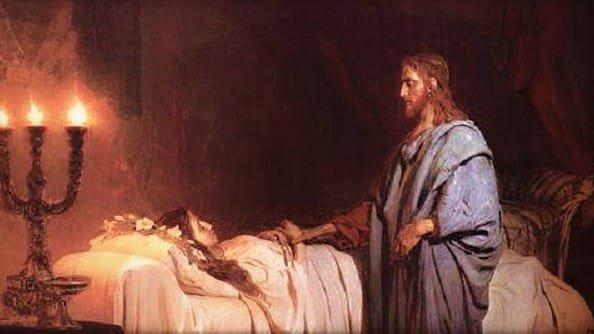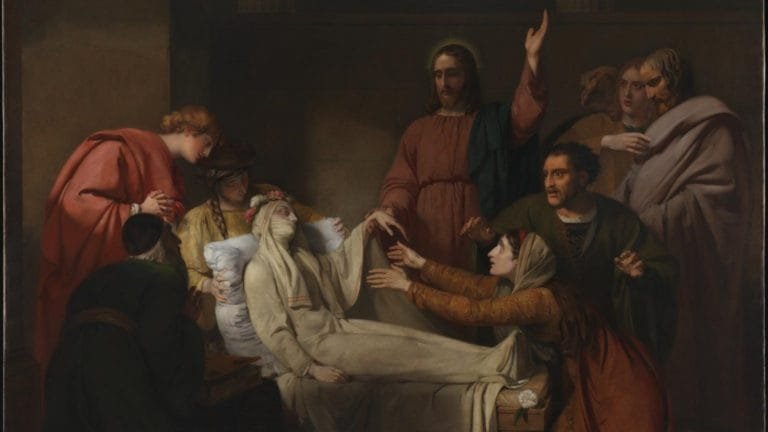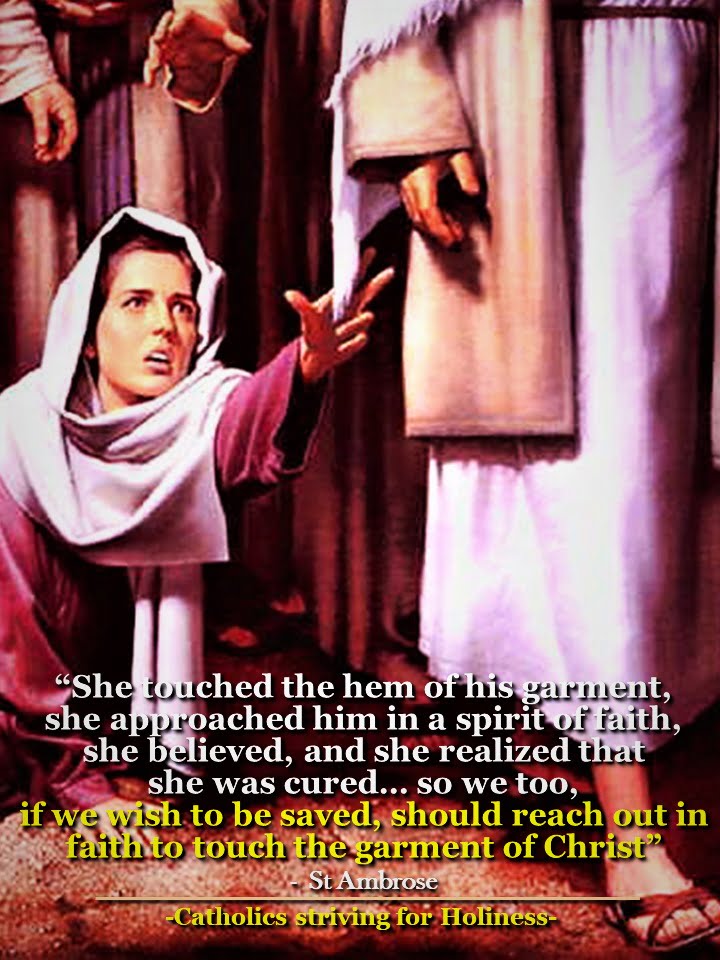13TH SUNDAY B GOSPEL COMMENTARY:
JAIRUS’ DAUGHTER AND THE WOMAN WITH HEMORRHAGE (Mk 5:21-43)
JAIRUS’ DAUGHTER AND THE WOMAN WITH HEMORRHAGE (Mk 5:21-43)

(25) There was a woman afflicted with hemorrhages for twelve years. She had suffered greatly at the hands of many doctors and had spent all that she had. Yet she was not helped but only grew worse. She had heard about Jesus and came up behind him in the crowd and touched his cloak. She said, “If I but touch his clothes, I shall be cured.” Immediately her flow of blood dried up. She felt in her body that she was healed of her affliction. (30) Jesus, aware at once that power had gone out from him, turned around in the crowd and asked, “Who has touched my clothes?” But his disciples said to him, “You see how the crowd is pressing upon you, and yet you ask, Who touched me?” And he looked around to see who had done it. The woman, realizing what had happened to her, approached in fear and trembling. She fell down before Jesus and told him the whole truth. He said to her, “Daughter, your faith has saved you. Go in peace and be cured of your affliction.”
While he was still speaking, people from the synagogue official’s house arrived and said, “Your daughter has died; why trouble the teacher any longer?” Disregarding the message that was reported, Jesus said to the synagogue official, “Do not be afraid; just have faith.” (37) He did not allow anyone to accompany him inside except Peter, James, and John, the brother of James. When they arrived at the house of the synagogue official, he caught sight of a commotion, people weeping and wailing loudly. (39) So he went in and said to them, “Why this commotion and weeping? The child is not dead but asleep.” (40) And they ridiculed him. Then he put them all out. He took along the child’s father and mother and those who were with him and entered the room where the child was. He took the child by the hand and said to her, “Talitha koum,” which means, “Little girl, I say to you, arise!” (42) The girl, a child of twelve, arose immediately and walked around. At that they were utterly astounded. He gave strict orders that no one should know this and said that she should be given something to eat.
GOSPEL OF ST. MARK
- vv. 21-43 Both Jairus and the woman with the flow of blood give us an example of faith in Christ’s omnipotence, for only a miracle can cure Jairus’ daughter, who is on her death-bed, and heal this lady, who has done everything humanly possible to get better.
- Similarly, the Christian should always expect God to help him overcome the obstacles in the way of his sanctification. Normally, God’s help comes to us in an unspectacular way, but we should not doubt that, if it is necessary for our salvation, God will again work miracles. However, we should bear in mind that what the Lord expects of us is that we should every day fulfil his will.
- v. 22 At the head of each synagogue was the archisynagogist, whose function it was to organize the meetings of the synagogue on sabbaths and holy days, to lead the prayers and hymns and to indicate who should explain the Sacred Scripture. He was assisted in his task by a council and also had an aide who looked after the material side of things.
- 25 This woman suffered from an illness which implied legal impurity (Lev 15:25f1).
- Medical attention had failed to cure her; on the contrary, as the Gospel puts it so realistically, she was worse than ever. In addition to her physical suffering — which had gone on for twelve years — she suffered the shame of feeling unclean according to the Law.
- The Jews not only regarded a woman in this position as being impure: everything she touched became unclean as well. Therefore, in order not to be noticed by the people, the woman came up to Jesus from behind and, Out of delicacy, touched only his garment. Her faith is enriched by her expression of humility: she is conscious of being unworthy to touch our Lord.
- “She touched the hem of his garment, she approached him in a spirit of faith, she believed, and she realized that she was cured… So we too, if we wish to be saved, should reach out in faith to touch the garment of Christ” (St Ambrose, Expositio Evangelii sec. Lucam, VI, 56. 58).
- 30 In all that crowd pressing around him only this woman actually touched Jesus — and she touched him not only with her hand but with the faith she bore in her heart.
- St Augustine comments: “She touches him, the people crowd him. Is her touching not a sign of her belief” (In Ioann. Evang., 26, 3).
- We need contact with Jesus. We have been given no other means under heaven by which to be saved (cf. Acts 4:12). When we receive Jesus Christ in the Holy Eucharist, we obtain this physical contact through the sacramental species. We too need to enliven our faith if these encounters with our Lord are to redound to our salvation (cf. Mt 13:58).
- 37 Jesus did not want more than these three Apostles to be present: three is the number of witnesses laid down by the Law (Deut 19:15).
- “For Jesus, being humble, never acted in an ostentatious way” (Theophilactus, Enarratio in Evanglium Marci, in loc.).
- Besides these were the three disciples closest to Jesus: later, only they will be with him at the Transfiguration (cf. 9:2) and at his agony in the Garden of Gethsemane (cf. 14:33).
- 39 Jesus’ words are in contrast with those of the ruler’s servants: they say: “Your daughter is dead”; whereas he says: “She is not dead but sleeping”.
- “To men’s eyes she was dead, she could not be awoken; in God’s eyes she was sleeping, for her soul was alive and was subject to God’s power, and her body was resting awaiting the resurrection. Hence the custom which arose among Christians of ring to the dead, whom we know will rise again, as those who are asleep” (St Bede, In Marci Evangelium expositio, in loc).
- What Jesus says shows us that, for death is only a kind of sleep, for he can awaken anyone from the dead when he wishes. The same happens with the death and resurrection of Lazarus. Jesus says: “Our friend Lazarus has fallen asleep, but I go to awaken him out of sleep.” And, when the disciples think that it is ordinary sleep he is referring to, our tells them plainly: “Lazarus is dead” (cf. Jn 11:1 1ff).
- 40-42 Like all the Gospel miracles the raising of the daughter of Jairus demonstrates Christ’s divinity.
- Only God can work miracles; sometimes he does them in a direct way, sometimes by using created things as a medium.
- The exclusively divine character of miracles — expecially the miracle of raising the dead — is noticed in the Old Testament: “The Lord wills and brings to life; he brings down to Sheol and raises up” (1 Sam 2:6), because he has “power over life and death” (Wis 16:13). And also in the Old Testament God uses men to raise the dead to life: the prophet Elijah revives the son of the widow of Sarepta by ‘crying to the Lord’ (cf. 1 Kings 17:21), and Elisha prevails on him to raise the son of the Shunammite (2 Kings 4:33).
- In the same way, in the New Testament the Apostles do not act by their own power but by that of Jesus to whom they first offer fervent prayer : Peter restores to life a Christian women of Joppa named Tabitha (Acts 9:36ff); and Paul, in Troas, brings Eutychus back to life after he falls from a high window (Acts 20:7ff). Jesus does not refer to any superior power; his authority is sovereign: all he has to do is give the order and the daughter of Jairus is brought back to life; this shows that he is God.
- Only God can work miracles; sometimes he does them in a direct way, sometimes by using created things as a medium.
- Jesus resurrects Jairo’s daughter and heals the sick woman. None of the evils of man can resist the wonderful power of Christ the Savior. The miracles he performs are the signs of his messianism, of his goodness, of his mercy, of his love.
- Saint Jerome comments: The Lord “asks, looking around, to discover the one who had touched him. Or did the Lord know who had touched him? Then, why did he ask for her? He did it as who knows it, but willing make it clear. If I had not asked and said, “Who has touched me?”, no one would have known that a sign had been made. They could have said: “He has not made any sign, but he boasts and speaks to glorify himself. “Therefore he asks, so that woman confesses and God is glorified …” Christ is the Truth. And as she had been cured by the Truth, the woman confessed the truth … The Church was resurrected and the Synagogue died. Although the girl had died, the Lord says, however, to the head of the synagogue: “Do not fear, have faith.” Let us also say today to the Synagogue, let us say to the Jews: “the daughter of the head of the Synagogue has died, but believe and rise again” … The Master says: “” the girl who has died for you lives for Me: for you she is dead, for me she sleeps. And she who sleeps may be awakened “… Behold, when Christ was going to resurrect the daughter of the head of the synagogue, he casts out everyone, so that it would not seem that he was doing it to boast. And” the girl stood up immediately and he began to walk. “That Jesus also touches us and we will start walking. Even if we are paralyzed, although we have done bad deeds and cannot walk, even if we are lying on the bed of our sins and our body, if Jesus touches us , we will be healed instantly (Commentary on the Gospel of Mark 5, 21).”
VIDEO REFLECTION
In today’s gospel reading, a synagogue official, Jairus, desperately goes to Jesus and pleads with Him to heal his very sick daughter. As Jesus accompanies Jairus to the latter’s home, He encounters a woman which took up His precious time. She had continuous bleeding for years and she was also desperate for healing. But she didn’t want to interrupt Jesus and His companions. She just wanted to touch any part of His clothing, believing she would be healed by just doing so. We reflect today on the interruptions of our life.
FOR TODAY’S SUNDAY REFLECTION, CLICK HERE.
FOR POPE FRANCIS ON TODAY’S GOSPEL CLICK HERE.
Stay updated: subscribe by email for free TO OUR NEW WEBSITE www.catholicsstrivingforholiness.org (PUT YOUR EMAIL IN THE SUBSCRIBE WIDGET).
We are also in www.fb.com/Catholicsstrivingforholiness. Kindly help more people in their Christian life by liking our page and inviting your family, friends and relatives to do so as well. Thanks in advance and God bless you and your loved ones! Fr. Rolly Arjonillo


